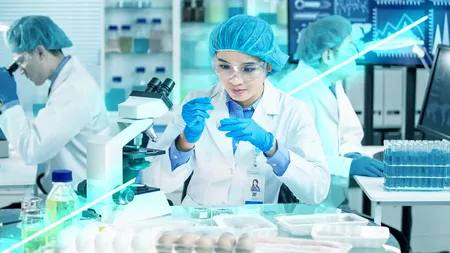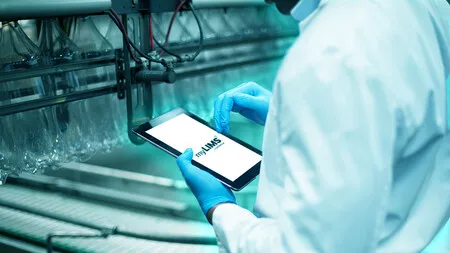August 29, 2025
Streamline ISO 17025 Compliance by Integrating LIMS Software in Your Food Testing Laboratory
Table of Content

If you are looking to implement ISO 17025 with a LIMS in your laboratory, it is essential to understand each step necessary to ensure traceability, correct documentation and accurate management of results, always complying with the highest international standards. In the field of physical-chemical and microbiological analysis of food, ISO 17025 certification represents much more than a simple legal requirement; It is the true hallmark of technical competence for quality control laboratories and service providers. With the increase in regulatory requirements, laboratories must adapt by adopting systems that ensure both the traceability of samples and the reliability of analytical processes.
In this article you will discover how implementing ISO 17025 with a LIMS can transform data management, facilitate certification, and position your organization as a leader in quality within the food industry.
Learn More: How LIMS Facilitates ISO 17025 Certification in Food Testing Labs
Advantages of Implementing ISO 17025 with a LIMS System in Laboratories
- Fundamentals of the standard for laboratories providing services:
ISO/IEC 17025 defines the requirements for laboratories to demonstrate technical competence, integrity of results, and operational reliability. Unlike standards such as ISO 9001, which focuses on overall quality management, ISO 17025 focuses on the technical validity of analytical methods, staff training, traceability and integrity of samples, and rigorous management of records and results.
- Impact on the competitiveness of laboratories:
ISO 17025 certification is recognized globally by regulatory authorities and food companies. Large chains and exporters require that the laboratories providing services comply with this standard to ensure that the physical-chemical and microbiological analyses are valid and internationally recognized. According to the experience reported by organizations such as ILAC, laboratories that achieve certification usually observe substantial improvements in their reputation, access to new markets and decreases in non-conformities during audits.
ISO 17025 Fundamental Requirements for Food Analysis
Management and Documentation System
A robust quality management system forms the backbone of ISO 17025. Laboratories must implement:
- Documented quality policies and objectives
- Control of documents and records
- Management of non-conformities and corrective actions
- Regular internal audits
- Management Reviews
Implementing a LIMS system helps centralize documentation and automate workflows, decreasing the risk of errors and ensuring regulatory compliance.
Technical Competence and Method Validation
The standard requires demonstrating technical competence through:
- Qualified personnel with documented continuing education
- Validation of analytical methods
- Estimation of measurement uncertainty
- Ensuring the quality of the results
- Participation in proficiency tests
Traceability and Sample Management
Sample traceability is one of the most critical and complex aspects of the standard, requiring:
- Unique identification of each sample
- Detailed record of reception conditions
- Chain of Custody (COC) Documentation
- Sample control throughout the analytical process
- Proper sample storage
The use of LIMS software allows these processes to be automated using labels, electronic records and alerts, helping to minimize the usual errors in sample handling and identification.
Learn More: Compliance Made Simple: Harness the Full Potential of LIMS Automation in Your Lab
Keys to Comply with ISO 17025 in Quality Control Laboratories Using LIMS
- Automation of Critical Processes
The integration of a laboratory information management system allows you to automate everything from the registration and tracking of samples, allocation of analyses and resources, calculations and validation of results, to the generation of standardized reports and the control of key performance indicators.
- Integration with Analytical Equipment
The current trend in modern laboratories is the direct integration of equipment with the laboratory information management system, which facilitates the automatic transfer of data, eliminates typical transcription errors and ensures full traceability. In addition, it allows you to manage calibrations, maintenance and alerts in the event of any deviation in real time.
- Data Management and Information Security
ISO 17025 sets strict requirements on data management: integrity of primary records, traceability of changes, periodic backups, role-based access control, and protection against unauthorized tampering. Leading LIMS systems comply with international regulations, such as 21 CFR Part 11 and GDPR, and exceed the capabilities of spreadsheet or physical file-based systems.
Preparing for the Future: Trends in Laboratory Certification
Complete Digitalization and Laboratory 4.0
The evolution towards the concept of Industry 4.0 is transforming the implementation of ISO 17025, with trends such as:
- Advanced automation of analytical processes
- Internet of Things (IoT) applied to laboratory equipment
- Artificial intelligence for predictive deviation detection
- Blockchain for immutable traceability of samples and results
Confience myLIMS incorporates these emerging technologies, preparing laboratories not only to meet today's requirements but also to adapt to future demands.
Sustainability and Reduction of Environmental Impact
The new version of ISO 17025 places greater emphasis on environmental sustainability. Modern laboratories are:
- Reducing paper consumption through digitization
- Optimizing the use of reagents and materials
- Being more efficient of chemical waste management
- Reducing operational carbon footprint
Conclusion
Implementing ISO 17025 in food laboratories is challenging, but it is fully achievable with the right technological tools. A specialized LIMS system, such as myLIMS, can be a key ally in the certification process, helping to ensure regulatory compliance, improving operational efficiency, and reinforcing the reliability of results.
Laboratories that have adopted this approach not only comply with the regulations, but also position themselves as leaders and quality benchmarks in their market.
Learn More: Enhancing Global Food Safety: Why the World Needs a LIMS
Are you ready to streamline ISO 17025 compliance by integrating LIMS software in your laboratory? Find out how myLIMS can be your strategic partner on this journey.
Best-in-class LIMS
Built for your success
See what makes Confience different. Speak with a member of our team.
Schedule a Demo




.webp)


